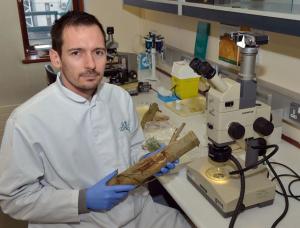Introducing Dr Richard O'Hanlon
Date published:
Dr Richard O’Hanlon recently took up the position of Principal Plant Pathologist in Grassland and Plant Science Branch. A native of Cork City, he has moved to the other end of Ireland to AFBI to investigate and work on plant health threats to the wider environment and horticulture industry - a position which he says is one-of-a-kind on the island of Ireland.

Richard said “Mycology and plant pathology is currently seen as an old science, relying on traditionally low-tech techniques. In many research institutes the jobs traditionally done by mycologists are now being passed to molecular biologists under the assumption that molecular biology can replace traditional pathology skills. This assumption is incorrect, as traditional plant pathology skills are vital in furthering our understanding of pathogen biology and epidemiology.”
“The best way forward for plant health research is collaborative research between plant pathologists and molecular biologists. The position in AFBI also appealed to me because of the close working relationship we have with the competent authority for plant health matters, DAERA. It is satisfying as a scientist to see your work appreciated, and even more so to see your work translated into scientifically informed policy decisions.”
Richard completed a Bachelors degree in Science Education in the University of Limerick in 2007. Following this he went on to do a PhD in fungal ecology in the University of Limerick, which included research visits to the University of British Columbia, Canada and Oregon State University, USA. His PhD work examined the biodiversity of fungi in Irish forests.
He said “There was a common misconception at the time (and still to some extent today) that non-native commercial plantation forests don’t support native biodiversity. My PhD work showed that where fungi (mushrooms and also symbiotic root fungal) are concerned, the non-native tree species Sitka spruce fostered just as much fungal biodiversity as native tree species such as oak and ash.”
Richard then followed this up with an international fellowship in the World Forest Institute, Portland, Oregon to examine the similarities/differences between the fungal biodiversity of Sitka spruce forests worldwide.
On his return to Ireland he took up a postdoc position in Teagasc examining plant pathology issues such as sudden larch death and ash dieback. Before coming to AFBI, he also worked in the Pesticide Registration Division of the Department of Agriculture, Food and the Marine, Ireland.
On the challenges ahead for him and his work, he said “Obviously with Brexit there are a lot of uncertainties with the situation between Northern Ireland and the Republic of Ireland. From the point of view of plant health there has always been excellent communication between the two countries in terms of their official plant health regulatory bodies (DAFM and DAERA) and between their scientific communities (such as the Society of Irish Plant Pathologists). The challenge will be to keep these communication channels open once the UK leaves the EU. From a biological point of view, a special case can easily be made to have strong links between bodies involved in plant health protection across the island of Ireland. The frequently stated fact that “pathogens don’t stop at borders” will remain as true as ever after Brexit.”
Increasing globalisation is another challenge that is becoming evident in plant health circles. The availability and relative ease of import of plants from anywhere in the world is creating new challenges for plant health scientists. Recent high-tech sequencing techniques are allowing the exploration of the microbial communities of plants and plant products to levels impossible in the past.
He said “We are finding that most plants that are imported have microbial “hitch-hikers”, and sometimes these hitch-hikers can cause significant harm to plants in natural ecosystems. The genus Phytophthora is one such example where we are finding several species present on imported plants. We must work with the horticultural industry, and the policy makers to devise strategies to reduce/prevent these pathogens from being transported. History has taught us that once a micro-organism has escaped into the wider environment it can be near impossible to eradicate. Prevention is the only feasible option when it comes to protecting plant health.”
Notes to editors:
AFBI carries out high quality technology research and development, statutory, analytical, and diagnostic testing functions for DAERA and other Government departments, public bodies and commercial companies.AFBI's Vision is “Scientific excellence in Northern Ireland … serving the world”.All media enquiries to AFBI Press Office